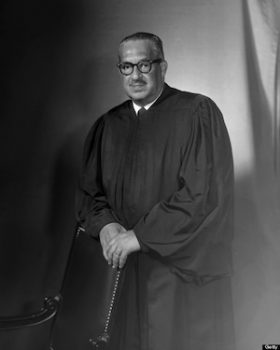Thurgood Marshall’s speech from 1987 in BlackPast:

I believe all of the participants in the current debate about affirmative action agree that the ultimate goal is the creation of a colorblind society. From this common premise, however, two very different conclusions have apparently been drawn: The first is that race-conscious remedies may not be used to eliminate the effects of past discrimination against Negroes and other minority groups in American society. This conclusion has been expanded into the proposition that courts and parties entering into consent decrees are limited to remedies, which provide relief to identified individual victims of discrimination only, But the second conclusion, which may be drawn from our common preference for a colorblind society, is that the vestiges of racial bias in America are so pernicious, and so difficult to remove, that we must take advantage of all the remedial measures at our disposal. The difference between these views may be accounted for, at least in part, by difference of opinion as to how close we presently are to the “colorblind society” about which everybody talks. I believe that, given the position from which America began, we still have a very long way to go. The Framers of our Constitution labored “In order to form a more perfect union, establish justice…and secure the blessings of the liberty.” These were beautiful words, but at the same time a Negro slave was but three-fifths of a man in the same Constitution. Negroes who, finding themselves purportedly the property of white men, attempted to secure the blessings of the liberty by voting with their feet and running away, were to be captured and returned to slavery pursuant to that same document.
The decisions of the Supreme Court in Prigg v. Pennsylvania and Ableman v. Booth demonstrated just how strong the assertion of federal power on behalf of the slaveholder could be. There was undeniable historical truth in Chief Justice Taney’s statement in Dred Scott that at the time of adoption of the Constitution Negroes “had for more than a century before been regarded as being of an inferior order, and altogether unfit to associate with the white race, either in social or political relations,” et cetera, et cetera, et cetera.
Our constitutional jurisprudence at that time rested upon this premise and it continued so for a century. So many have forgotten.
More here. (Note: Throughout February, we will publish at least one post dedicated to Black History Month)
